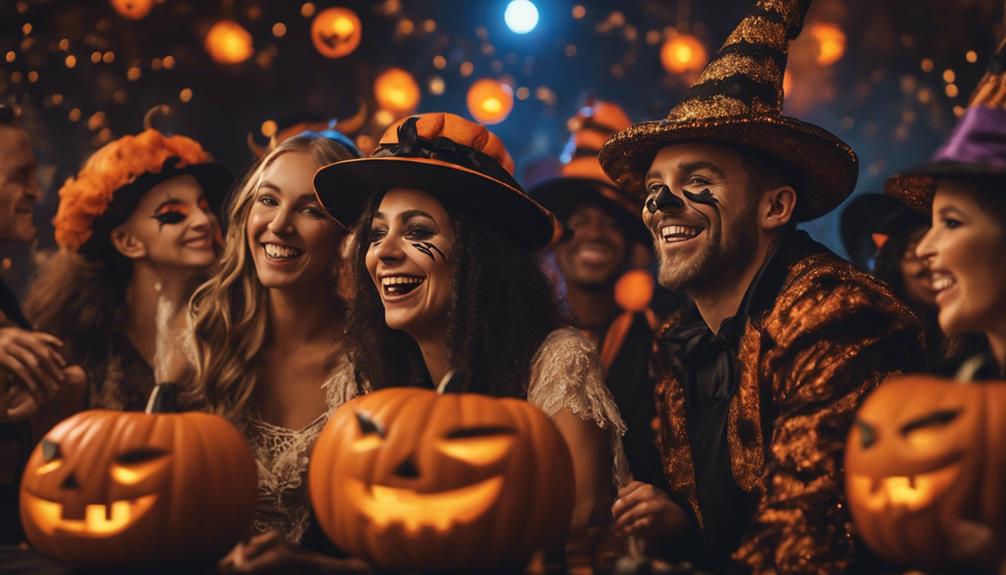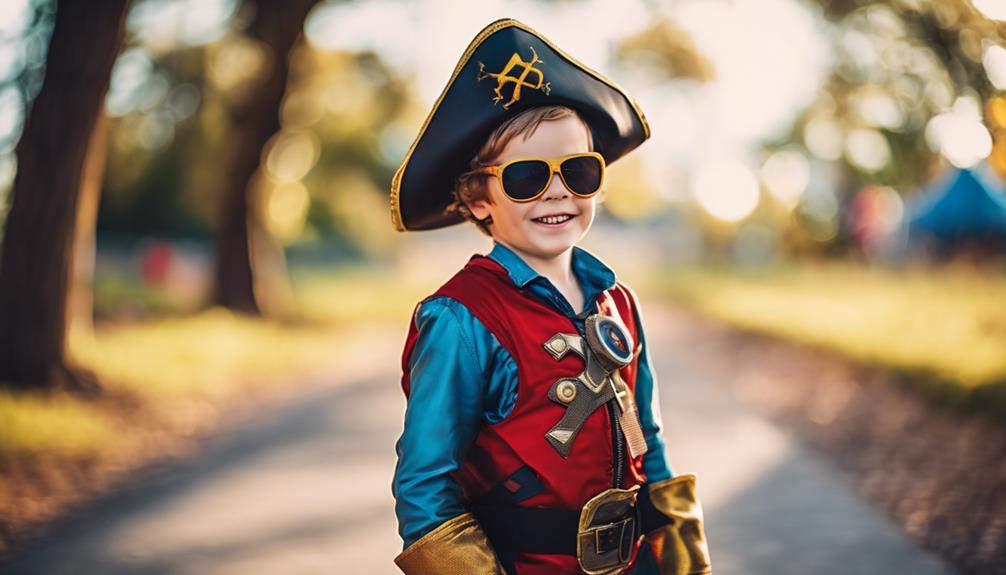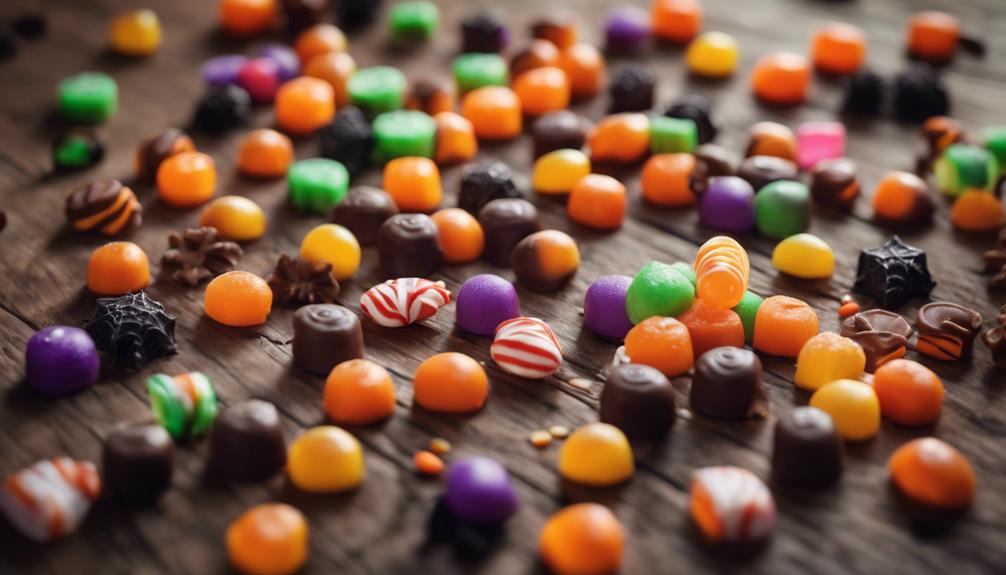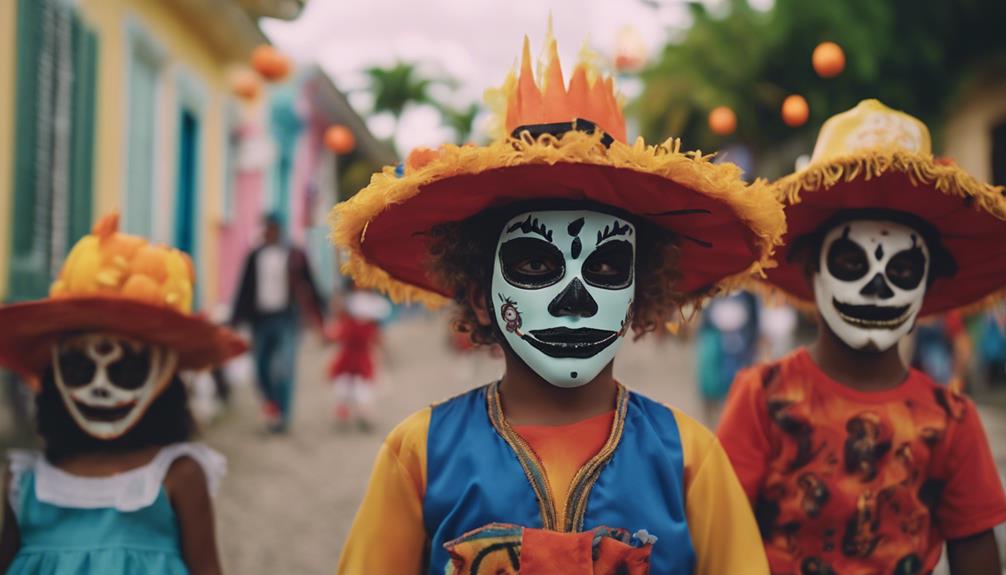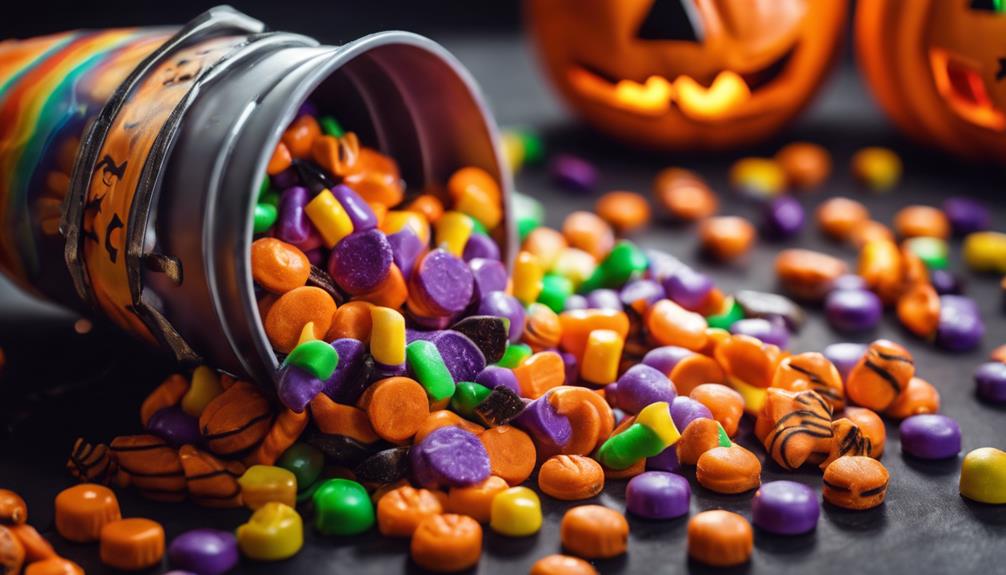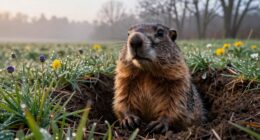People dress up for Halloween to honor ancient traditions like Samhain, where disguises were worn to ward off spirits. It's evolved into a mix of historical roots and modern creativity, offering a chance to step into different roles and boost confidence while showcasing individuality. Costumes bridge the living and the dead, allowing for exploration of different personas and cultural expressions. From movie characters to mythical creatures, Halloween attire reflects personal interests and fosters communal bonds. This festive tradition provides a rich tapestry of imagination and community, blending the past with the present in a vibrant celebration.
Key Takeaways
- To ward off evil spirits and blend in with roaming spirits during the ancient Celtic festival of Samhain.
- Evolution of costume traditions from simple disguises to elaborate outfits reflecting personal expression.
- Psychological benefits like boosting confidence, enhancing creativity, and creating a sense of community.
- Symbolism in costumes bridges the gap between the living and the dead, enabling exploration of different personas.
- Impact of pop culture on costume choices, influenced by movies, TV shows, celebrities, and cultural trends.
Historical Origins of Halloween Costumes
Historically, people have worn costumes during Halloween to ward off evil spirits and celebrate the ancient Celtic festival of Samhain. This tradition dates back over 2,000 years when the Celts believed that on the night of Samhain, spirits roamed the earth. To protect themselves, people would dress in scary masks and disguises to trick the spirits into passing them by. The concept of costumes during Halloween was rooted in the idea of blending in with the spirits to avoid any harm.
During the ancient Celtic festival of Samhain, dressing up in costumes was a way to confuse wandering spirits. By wearing frightening masks and garments, individuals aimed to avoid being recognized by any malevolent entities that may be present. This practice of donning disguises eventually evolved into the elaborate costume traditions we see today during Halloween festivities. The act of dressing up not only served a practical purpose but also became a fun and creative way to celebrate this spooky season.
Evolution of Costume Traditions
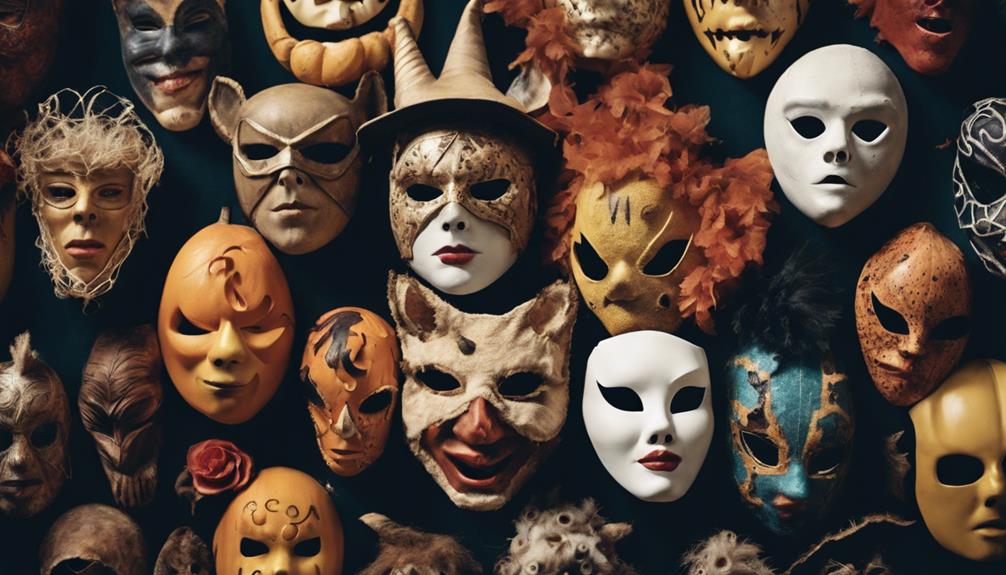
The evolution of costume traditions during Halloween showcases a blend of historical influences and modern creativity. Originally rooted in the ancient Celtic festival of Samhain, where costumes were worn to ward off evil spirits, Halloween costumes have transformed over time.
From simple disguises to elaborate outfits, the tradition of dressing up has expanded to encompass a wide range of options. Today, Halloween costumes reflect a mix of historical, cultural, and commercial influences, offering something for everyone. People can choose from spooky and scary costumes to more light-hearted and whimsical ones, allowing for personal expression and creativity.
This evolution in costume traditions has brought diversity to the choices available, making Halloween a time for both fun and exploration. Whether inspired by ancient traditions or modern trends, the variety of Halloween costumes continues to capture the spirit of the holiday in new and exciting ways.
Psychological Aspect of Dressing Up
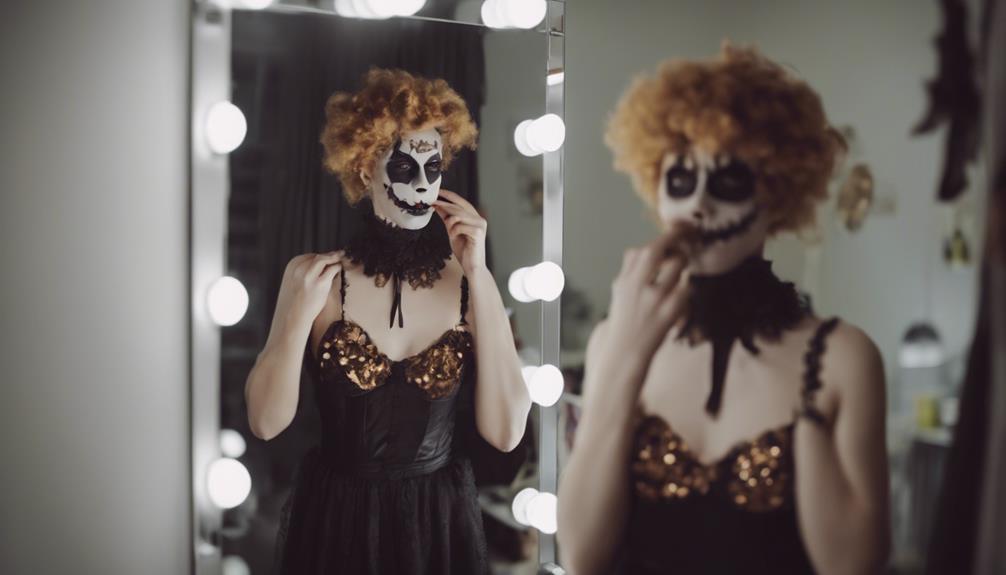
Exploring the psychological aspect of dressing up for Halloween reveals how individuals can temporarily embody alternate personas, fostering self-expression and creativity. The act of donning a Halloween costume goes beyond mere fabric and makeup; it ventures into the domain of psychology, offering a myriad of benefits for the wearer:
- Temporary Escape: Costumes provide a temporary escape from reality, allowing individuals to step into a different identity and leave behind their everyday concerns.
- Boost in Confidence: Psychological studies suggest that wearing costumes can boost confidence levels, enabling individuals to express themselves more freely.
- Enhanced Creativity: Engaging in role-playing through costumes enhances creativity and imagination, sparking joy and excitement in the wearer.
- Sense of Community: Dressing up creates a sense of community during Halloween celebrations, fostering a shared experience among participants.
Through the psychological lens, Halloween attire serves as a vessel for self-exploration, communal bonding, and the playful exploration of different facets of one's personality in a safe and enjoyable manner.
Social Significance of Halloween Attire
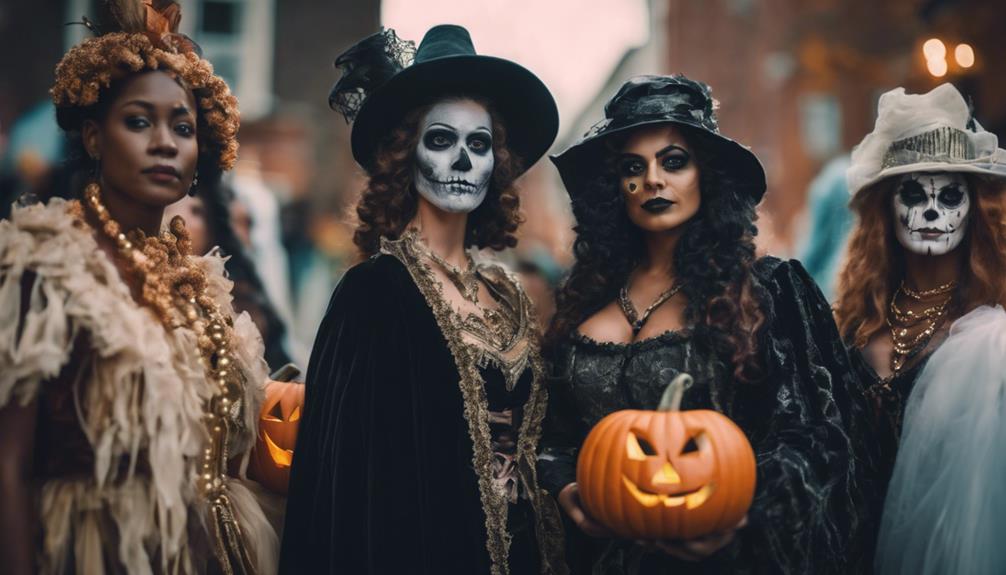
Halloween attire holds a significant social meaning through its symbolic representation and cultural expression, reflecting individual creativity and identity. Costumes allow people to step into different roles, fostering storytelling and interaction within social circles.
Costume Symbolism
Amidst the playful festivities of Halloween, costume symbolism plays a pivotal role in bridging the gap between the worlds of the living and the dead. Halloween attire holds significant meaning beyond just dressing up for fun.
- Costumes symbolize the boundary between the living and the dead, allowing for a playful interaction with supernatural forces.
- Dressing up provides a sense of anonymity and freedom to embody different characters or personas.
- Costumes serve as a form of self-expression, creativity, and imagination, enabling individuals to explore different aspects of their personality.
- Halloween attire fosters a sense of community and shared experience, as people come together to celebrate the tradition of dressing up.
Cultural Expression
In the world of social gatherings, dressing up for Halloween functions as a canvas for individuals to artistically express their cultural inclinations and personal identities. Halloween attire goes beyond mere costume selection; it serves as a powerful tool for cultural expression.
People showcase their creativity, beliefs, and interests through their chosen outfits, weaving a tapestry of diverse traditions and identities within the community. This cultural expression through Halloween costumes fosters social interaction, enabling individuals to connect with others who share similar cultural backgrounds or interests.
The act of dressing up on Halloween not only promotes a sense of community but also creates a festive atmosphere where people come together to celebrate their uniqueness and shared traditions in a spirit of fun and camaraderie.
Symbolism in Halloween Costumes
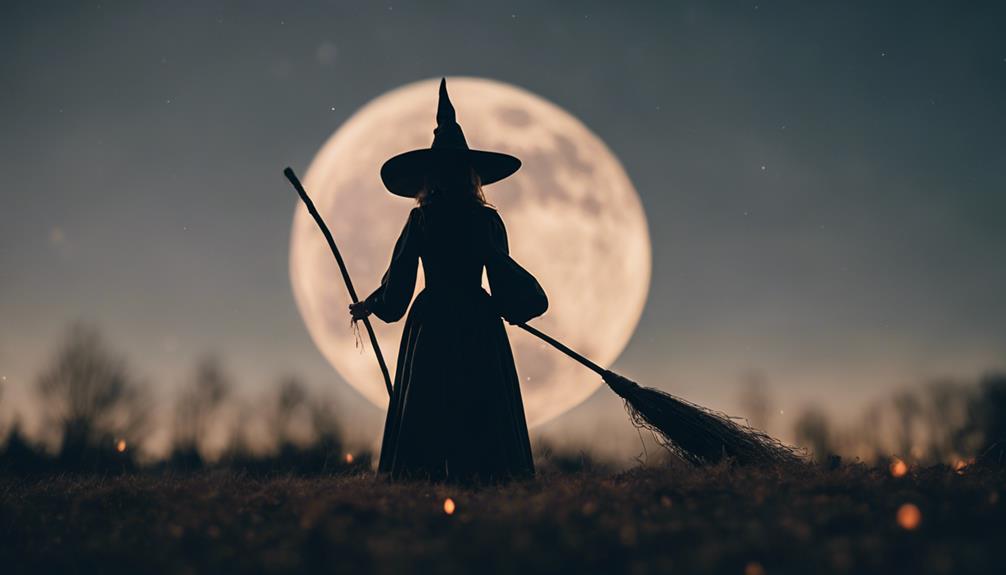
Halloween costumes carry deep symbolism rooted in ancient beliefs and customs, serving as a bridge between the earthly domain and the spirit world. These costumes have a historical significance, originating from practices to protect against malevolent forces during Samhain.
Today, modern costume trends continue to reflect these age-old traditions in various forms and themes.
Costume Symbolism Explained
During the ancient Celtic festival of Samhain, Halloween costumes served as symbolic shields against evil spirits and the supernatural, embodying a tradition of disguise and protection.
- Costumes on Halloween symbolize protection from evil spirits and the unknown.
- Dressing up allows individuals to hide from wandering spirits and ghosts.
- Symbolism in costumes includes cultural references and personal expression.
- Costumes can represent themes of fear, fantasy, humor, or popular culture.
Historical Costume Origins
Originating from an ancient Celtic festival, Halloween costumes served as protective disguises against malevolent spirits and the unknown. During Samhain, the Celtic festival marking the end of the harvest season and the beginning of winter, people believed the veil between the living and the dead was at its thinnest. By wearing disguises, individuals aimed to trick evil spirits, avoiding recognition and potential harm.
This tradition of donning costumes evolved over time, incorporating elements of fear, protection, and folklore. Masks and costumes were strategically used to confuse spirits, reflecting deep-rooted superstitions and beliefs. The symbolism behind Halloween costumes lies in the idea of shifting between seasons and the worlds of the living and the dead, a tradition that continues to be celebrated today.
Modern Costume Trends
Symbolizing contemporary cultural icons and personal interests, modern Halloween costumes often serve as creative expressions of individuality. When choosing a costume, people draw inspiration from a wide range of sources, reflecting their diverse interests and passions.
Some opt for costumes depicting popular culture figures like superheroes or movie characters, adding a touch of fantasy to their celebrations. Others use costumes as a form of social commentary, making clever or satirical choices to express their views on current events or trends.
For many, dressing up on Halloween is a way to explore different aspects of themselves, experimenting with new identities and showcasing their creativity. The symbolism in Halloween costumes goes beyond mere attire, offering a glimpse into the wearer's personality and interests.
Impact of Pop Culture on Costumes
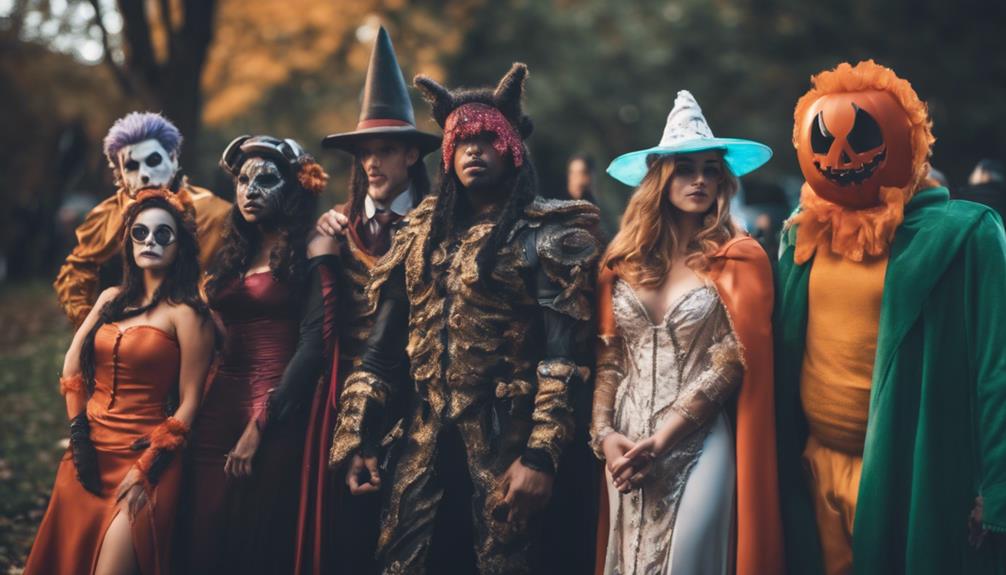
Pop culture greatly influences the choices people make when selecting Halloween costumes, with a notable emphasis on characters from movies, TV shows, music, and current trends. Costumes inspired by celebrities, superheroes, and iconic figures are popular due to their prevalence in mainstream media. Additionally, LGBTQ+ communities have made significant contributions to Halloween attire by incorporating their unique and creative styles into costume trends. Furthermore, modern Halloween costumes often draw inspiration from trending memes, viral videos, and internet sensations, highlighting the close relationship between pop culture and costume choices. This influence is evident in the shift towards more overtly sexy, campy, and attention-grabbing outfits that reflect current cultural norms and preferences.
| Pop Culture Characters | Celebrities | Superheroes |
|---|---|---|
| Harry Potter | Beyoncé | Spider-Man |
| Elsa (Frozen) | Kim Kardashian | Wonder Woman |
| The Joker (Batman) | Lady Gaga | Black Panther |
| Stranger Things Characters | Cardi B | Captain America |
| Black Widow (Avengers) | Ariana Grande | Iron Man |
Cultural Influences on Costume Choices
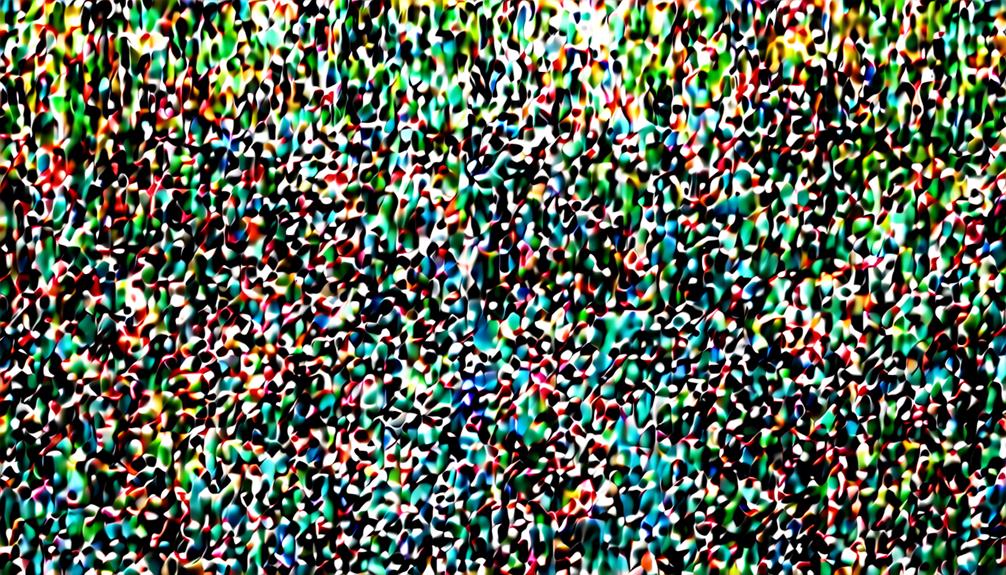
Cultural influences play a significant role in shaping Halloween costume choices. Symbols and references drawn from popular culture can be seen in the costumes people choose to wear.
Celebrating diversity and individual expression, costume selections often reflect current cultural trends and personal interests.
Costume Symbolism
When selecting costumes for Halloween, individuals often draw upon cultural influences to embody characters that reflect historical traditions and contemporary trends. Costumes can hold significant symbolic meanings, representing various aspects such as personal interests, creative outlets, and playful self-expression.
Here are some ways in which costume symbolism plays a role in Halloween attire:
- Costumes inspired by cultural symbols like witches, vampires, ghosts, and supernatural beings.
- Personal interests and fantasies reflected through costume choices.
- Creative outlet for individuals to express their identities.
- Symbolic representations of historical events, societal issues, or iconic figures.
Pop Culture References
Drawing inspiration from contemporary trends and media, Halloween costume choices often reflect the influence of popular culture references. Iconic characters from movies, TV shows, and celebrities serve as popular sources of inspiration for individuals looking to make a statement with their costumes.
Whether it's dressing up as beloved superheroes, infamous villains, or recognizable cultural figures, these choices resonate with a wide audience due to their widespread recognition. Trends in pop culture heavily dictate the popularity of certain costumes each year, showcasing society's current interests and obsessions.
Additionally, social media platforms play an important role in promoting pop culture-inspired costumes, influencing what people choose to wear for Halloween by showcasing popular trends and inspiring creativity. The integration of pop culture references in Halloween costumes highlights the dynamic relationship between entertainment media and costume choices during the festive holiday.
Gender Roles in Halloween Dress-Up

Reflecting societal norms and stereotypes, gender roles in Halloween dress-up often dictate the type of costumes boys and girls are encouraged to wear. Traditional expectations tend to emphasize masculinity for boys and femininity for girls, shaping the options available to them. Boys are often steered towards costumes that embody strength and power, such as superheroes, pirates, or monsters. Conversely, girls' costumes typically focus on beauty and sweetness, with princesses, fairies, or animals being popular choices.
However, the evolving landscape of Halloween costumes is becoming more inclusive and diverse, offering gender-neutral or unisex options that provide alternatives for children who don't conform to traditional gender roles. This shift challenges stereotypes and encourages creativity and self-expression among all individuals, regardless of societal expectations.
- Boys' costumes emphasize strength and power.
- Girls' costumes focus on beauty and sweetness.
- Gender-neutral options challenge traditional roles.
- Inclusive and diverse costumes promote creativity and self-expression.
Costume Trends and Themes
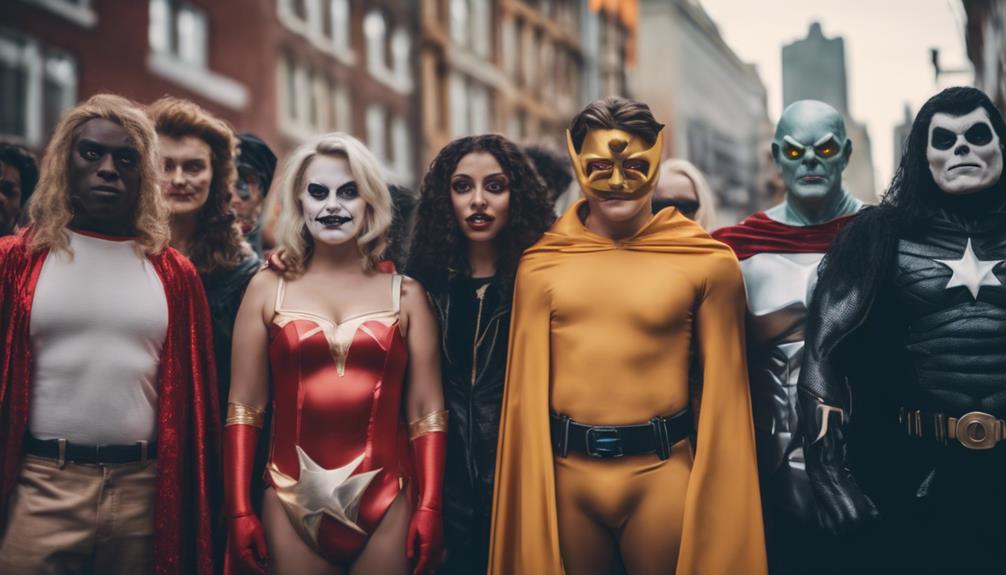
Gender roles in Halloween dress-up influence the choice of costumes for boys and girls, but when it comes to Costume Trends and Themes, the focus shifts to popular and diverse options that reflect current pop culture and historical influences.
Halloween celebrations often see a wide array of costume themes, with some of the most popular choices being witches, vampires, superheroes, animals, and movie characters. These trends in costumes on Halloween tend to mirror what's popular in TV shows, movies, and video games at the time. Additionally, historical figures, mythical creatures, and fantasy worlds inspire many costume themes.
For those who prefer scary costumes, options like zombies, ghosts, werewolves, and monsters are commonly chosen. When attending a Halloween party, individuals often opt for group themes, couple costumes, or get creative with DIY ensembles.
The variety of costume themes available allows individuals to express themselves and immerse in the spirit of Halloween through their choice of attire.
Personal Expression Through Costumes
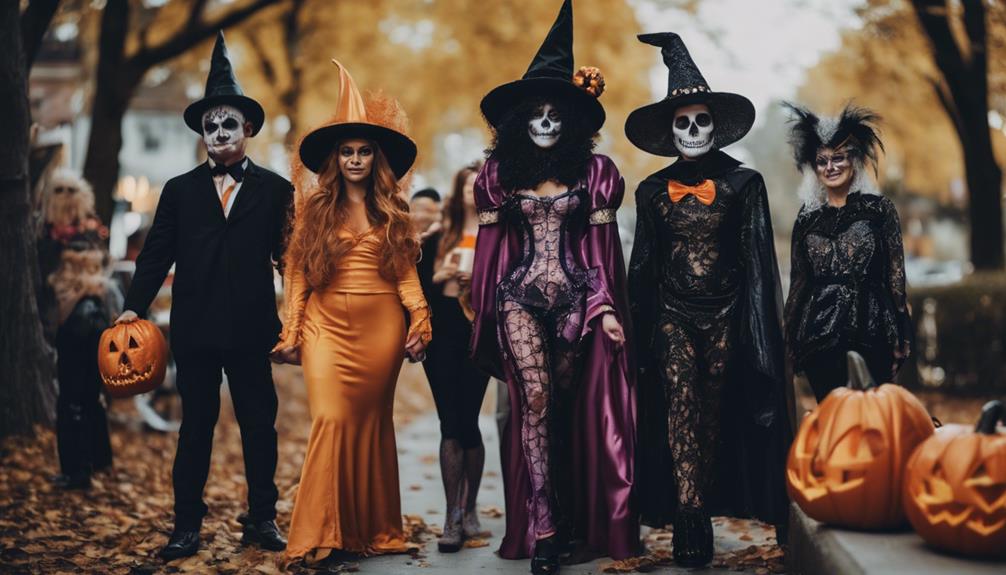
Individuals embrace Halloween as an opportunity to showcase their unique personalities and creativity through the choice of costumes they wear. Halloween allows for personal expression through elaborate costumes that go beyond the ordinary attire. It's a chance to step into different roles and characters, embodying a fantasy or bringing a beloved fictional figure to life for a day of festive celebration. Planning and creating these outfits become a form of self-expression, where individuals can add their personal touch to their Halloween look, reflecting their individuality and imaginative flair.
- Costumes provide a fun way to express creativity.
- Halloween attire showcases individuality and self-expression.
- Creating elaborate costumes adds a personal touch to festive attire.
- Dressing up fosters a sense of community and camaraderie among participants.
Frequently Asked Questions
Why Did People Originally Dress up for Halloween?
People originally dressed up for Halloween to disguise themselves from evil spirits during the ancient Celtic festival of Samhain. Wearing costumes was believed to ward off ghosts and other malevolent beings as the veil between worlds was thinnest on that night.
The tradition evolved from wearing disguises to trick wandering spirits and protect against harm. Costumes allowed individuals to blend in with supernatural entities and partake in festivities without fear of supernatural reprisal.
Why We Might Dress up for Halloween?
People dress up for Halloween to embrace creativity, embody characters, and partake in playful festivities. Costumes allow individuals to connect with traditions, express imagination, and join in community celebrations.
The act of dressing up adds excitement, fun, and mystery to the holiday. It's a way to escape reality, engage in role-playing, and enjoy the spirit of Halloween.
Dressing up is a tradition that brings people together in a unique and entertaining manner.
Why Is Dressing up for Halloween Important?
Dressing up for Halloween is important as it fosters creativity, connects people with traditions, and promotes community unity. Individuals can express themselves through costumes, adding fun and excitement to the holiday.
It allows for role-playing and a break from routine, enhancing the festive spirit. By embracing costumes, people can immerse themselves in the Halloween experience, creating memorable moments and strengthening social bonds.
What Is the True Meaning of Halloween?
The true meaning of Halloween traces back to ancient Celtic traditions, particularly the festival of Samhain. During this time, people believed that the veil between the living and the dead was thinnest, allowing spirits to wander the earth.
Dressing up in costumes originally aimed to protect individuals from malevolent entities by disguising their true selves. This practice eventually transformed into the festive tradition of Halloween as it's recognized today, celebrated worldwide with costumes and fun.
Conclusion
To sum up, dressing up for Halloween has deep historical roots and cultural significance. It allows individuals to express themselves creatively, explore different identities, and participate in a communal celebration.
For example, a study showed that children who wore superhero costumes felt more confident and outgoing while trick-or-treating.
Overall, Halloween costumes play a crucial role in bringing people together, sparking imagination, and adding a touch of fun and excitement to the holiday festivities.
